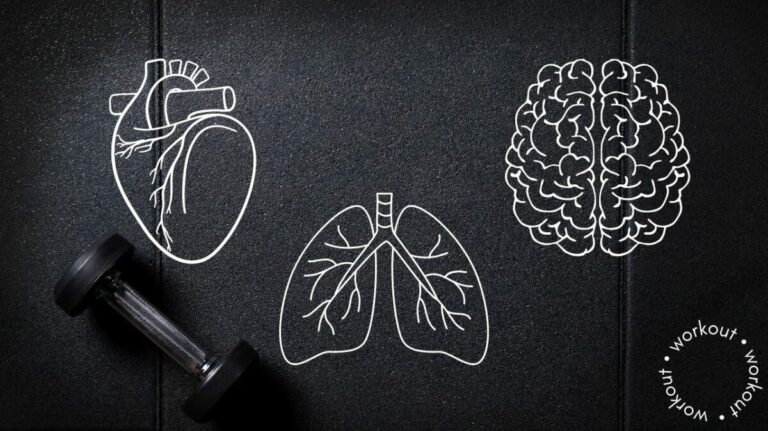
It’s that time of year again… The news is filled with stories about a “triple-demic” and “highly mutated strains.” Boosters? Masks? Wait… which arm? When? It’s enough to make you go crazy!
COVID-19 infection (and long COVID) affects multiple organ systems, including the respiratory, cardiovascular, renal, digestive, neuroendocrine, musculoskeletal systems, and sensory organs. So, what should you do? Drum roll…….EXERCISE!
Research suggests that exercise should be considered a first-line strategy in the prevention and treatment of COVID-19 infection and long COVID disease. Exerkines, released during exercise, have a potent crosstalk effect between multiple body systems. Exerkines can mitigate the effects of COVID-19 in each organ system that the virus affects.
“Long COVID” has been identified as a post COVID-19 infection condition that affects at least 65 million individuals worldwide. This chronic disease impacts the heart, lung, pancreas, kidney, spleen, liver, blood vessels, and the neurological, gastrointestinal, immune, and reproductive systems with a wide variety of pathology.
Furthermore, COVID-19 infection (and long COVID) increases the risk of medical conditions, including cardiac arrest, heart failure, stroke, pulmonary embolism, diabetes, myalgic encephalomyelitis, and dysautonomia with breakthrough afflictions of coagulation, hematological, pulmonary, and neurological conditions. There are currently no validated effective treatments for long COVID.
Consistently meeting physical activity guidelines has been associated with reduced risk of severe COVID-19 infection outcomes, i.e., hospitalization (22% to 42% reduction), ICU admission (34% to 38% reduction), deterioration, and death (43% to 83% reduction) (4–7), across demographic and clinical characteristics. Furthermore, those engaged in regular physical activity have an 11% to 22% lower risk of infection.
The greatest benefit is provided by achieving at least 500 metabolic equivalent of task (MET)-minutes per week of physical activity, which is equivalent to 150 minutes of moderate-intensity or 75 minutes of vigorous-intensity physical activity per week. Studies also have found that cardiorespiratory fitness (CRF) is a predictor of COVID-19 disease progression and mortality.

Exercise has an anti-inflammatory effect, which also may oppose the systemic inflammation that occurs with COVID-19 and injures heart tissue. In addition, the release of muscle-derived mesenchymal stem cells during exercise has been purported to repair cardiomyocytes. This mechanism may be important when heart tissue has been damaged with COVID-19 infection, or long COVID
The mucosal immune system, in the upper respiratory tract, plays an important role in defending against viral infections like COVID-19. Increasing aerobic capacity can enhance immunity through immune cells and immunoglobulins advancement and regulating CRP levels. It could act as an antibiotic and antioxidant, restoring normal lung tissue elasticity and strength.
Exercise has been shown to increase the levels and function of immune cells like T-lymphocytes, neutrophils, macrophages, and monocytes, as well as increase the levels of immunoglobulins like IgA, which play a vital role in fighting lung infections. Secretory IgA, in particular, is an antibody that helps to neutralize viruses and prevent them from entering cell.
Further, exercise can potentially enhance the production of secretory IgA in the respiratory tract. Exercise duration may play a protective role in the respiratory tract through discriminatory change in mucosal immunity through the cellularity, antiviral activity, and gene expression.
A study that assessed whether exercise-induced myokines would mitigate the COVID-19 infectivity of the bronchial epithelium through angiotensin-converting enzyme 2 -ACE2 intonation demonstrated evidence suggesting exercise has a protective effect against COVID-19.
A recent review on neuroendocrine symptoms of COVID-19 hypothesized that exercise attenuates β-cell dysfunction and the long-term neuroendocrine effects of COVID-19 by moderating the inflammatory response, supporting brain homeostasis, and promoting insulin sensitivity. Long COVID also has been associated with increased stress levels, anxiety, and depression.
Regular exercise has been shown to alleviate stress and anxiety and has been associated with lower odds of incident depression or an increase in subclinical symptoms. The evidence
It also is important for damaged/nonfunctioning cells/organelles (as can occur with COVID-19 infection) to be removed so that body systems may function optimally. Exercise may help this process since autophagy occurs with every exercise session, within the heart, pancreas, liver, adipose tissue, brain, and skeletal muscle.
Noteworthy for COVID-19 rehabilitation is that research has identified that mitochondria are damaged with COVID-19 infection and are involved in symptoms (such as fatigue) of long COVID. Exercise has been found to “clean-up” nonfunctioning, damaged mitochondria, and thus ensure that energy production is optimized, and skeletal muscle health is maintained.
Interest in the potential impact of physical activity on vaccine effectiveness also was piqued by the COVID-19 epidemic, as it became apparent that vaccines were a powerful tool in lowering morbidity and mortality.
Previous cross-sectional studies and randomized controlled trials have demonstrated increased postvaccination antibody titer levels in adults who engage in regular physical activity. This effect appears to be particularly beneficial in the elderly.
What did you think I was going to say? Eat Doughnuts?
Find this column and others from the October 2023 issue here!

*Dr. Peters is the founder of “The Fitness Doctor” (www.thefitnessdoctors.com). He has a Ph.D. in Physiology from Kent State University and is a certified member of the American College of Sports Medicine. Dr. Peters was born and raised in the Cleveland area and is a graduate of St. Ignatius High School and John Carroll University. He can be reached at [email protected]





Monthly newsmagazine serving people of Irish descent from Cleveland to Clearwater. We cover the movers, shakers & music makers each and every month.
Since our 2006 inception, iIrish has donated more than $376,000 to local and national charities.
GET UPDATES ON THE SERIOUS & THE SHENANIGANS!